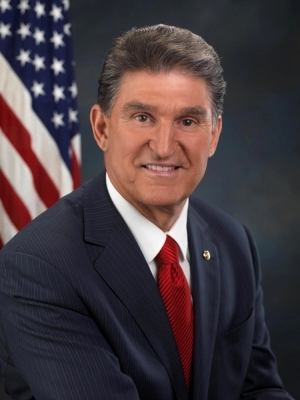CHARLESTON – Inflation just this year has eaten up all of the wage increases working Americans have gained in the last five years, according to a Harvard economist and former key adviser to President Obama.
For the West Virginia household, that means nearly a $1,000 annual loss. The issue has drawn the attention of both of the Mountain State’s U.S. senators.
Inflation was at 5.4 percent in July, according to a government report released August 11. That’s the third consecutive month above 5 percent. Inflation was 1.4 percent in January when President Biden took office.

Manchin
Jason Furman, former Obama chairman of the Council of Economic Advisors and current Harvard economist, created an analysis last month showing the wage-to-price ratio fell in the second quarter of 2021. That means workers lost buying power.
"Paychecks aren't going as far as they used to," Furman wrote of his analysis. "Price increases have outpaced compensation growth in 2021, causing real compensation to fall. In June 2021, real compensation was 0.7 percent below December 2019 levels, and 2 percent below its pre-pandemic trend."
Data shows the median West Virginia household income is $48,890. If the average American is losing 2 percent of their pre-pandemic salary compared to today because of inflation, that equals a $977.80 reduction.
Economists, and at least U.S. Senator Joe Manchin (D-W.Va.), are concerned the spending only will increase that pay gap.
After voting yes on a procedural budget reconciliation process vote August 11, Manchin expressed his worries.
“I believe it is important to discuss the fiscal policy future of this country,” Manchin said. “However, I have serious concerns about the grave consequences facing West Virginians and every American family if Congress decides to spend another $3.5 trillion.
“Over the past year, Congress has injected more than $5 trillion of stimulus into the American economy – more than any time since World War II – to respond to the pandemic. The challenge we now face is different: millions of jobs remain unfilled across the country and rising inflation rates are now an unavoidable tax on the wages and income of every American. These are not indications of an economy that requires trillions in additional spending.”
Manchin said adding trillions of dollars more to the national debt of nearly $29 trillion “without any consideration of the negative effects on our children and grandchildren, is one of those decisions that has become far too easy in Washington.”
“Given the current state of the economic recovery, it is simply irresponsible to continue spending at levels more suited to respond to a Great Depression or Great Recession – not an economy that is on the verge of overheating,” Manchin said. “More importantly, I firmly believe that continuing to spend at irresponsible levels puts at risk our nation’s ability to respond to the unforeseen crises our country could face.
“I urge my colleagues to seriously consider this reality as this budget process unfolds in the coming weeks and months.”
Sen. Shelley Moore Capito (R-W.Va.) also voiced her concerns, comparing the Democrats’ plan to buying grocery items with someone else’s money.
“It’s exactly what the Democrats are planning to do to the tune of $3.5 trillion – yes, trillion with a ‘t’ – to check off their wish list of government expansion and social welfare programs,” Capito wrote August 13. “And, they’re planning to do it without any input from Republicans who make up exactly half of the U.S. Senate, once again proving their calls for ‘unity’ and ‘bipartisanship’ usually ring hollow in the end.”
She said the “reckless” tax and spend spree is filled with taxes on the middle class and on small businesses.
“If it seems like the everyday items we buy are getting more expensive, or that $20 doesn’t go as far at the gas pump as it used to, you can thank President Biden’s inflation crisis, which is being fueled by the trillions of dollars that has already been poured into the economy,” Capito wrote. “Thanks to inflation, Americans are paying higher prices for many of the goods and services they can’t do without.
“In June, prices for U.S. consumers increased by 5.4 percent from the year prior, the biggest jump in 13 years.”
A former top economic adviser to President Trump said the $1.2 trillion infrastructure bill and the $3.5 trillion spending plan could lead to even more issues.
Steve Moore says the new spending contains "fiscal and policy atrocities" that could cause the national debt to triple by 2050, calling such growth “banana republic levels of debt.”
Senate Majority Leader Chuck Schumer (D-N.Y.) responded to Manchin’s concerns.
“Some are worried about inflation,” he said. “The way you deal with that, according to economists, is to make sure we pay for it. We intend to pay for it.
“There are some in my caucus who might believe it's too much there are some in my caucus who might believe it's too little. I can tell you this: in reconciliation, one, we are going to all come together to get something done and two it will have every part of the Biden plan in a big bold robust way."
When asked about Manchin’s inflation concerns, Schumer said the plan is to pay for the agenda with tax increases that follow Biden’s rules.
“By closing loopholes, having the wealthy and big corporations finally, finally, finally pay their fair share,” Schumer said.
